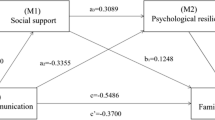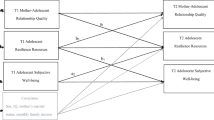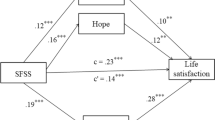Abstract
Low family socioeconomic status (SES) is linked with adolescents’ symptoms of depression, but little is known about the mediating and moderating mechanisms underlying this association. Based on ecosystem theory and the organism-environment interaction model, we tested whether emotional resilience mediated the relationship between family SES and depressive symptoms, and whether parent–child relationship quality moderated the relationship. Adolescents (N = 724) from one middle school in central China completed self-reported questionnaires regarding demographic variables, family SES, emotional resilience, parent–child relationship quality, and depressive symptoms. Regression-based mediation analysis indicated that emotional resilience mediated the association between family SES and depressive symptoms. Parent–child relationship quality moderated two components of this mediation process, namely the effects of low SES on both emotional resilience and depressive symptoms. In both cases, a high quality parent–child relationship ameliorated the adverse effects of low family SES. That is, adolescents with a higher quality relationship with their parent appeared to be less affected by low family SES. The study reveals how and when family SES may affect adolescents’ depressive symptoms, and highlights the protective effect of a high quality parent–child relationship in a low SES environment.
Highlights
-
Low family SES was associated with adolescents’ depressive symptoms.
-
Low family SES as a risk environment may hinder emotional resilience, increasing the risk for depression.
-
A high quality parent–child relationship can buffer adolescents from the effects of low SES on depression.
-
More attention should be paid to protective factors for positive youth development (PYD) in low SES environments.



Similar content being viewed by others
References
Armstrong, A. R., Galligan, R. F., & Critchley, C. R. (2011). Emotional intelligence and psychological resilience to negative life events. Personality and Individual Differences, 51(3), 331–336. https://doi.org/10.1016/j.paid.2011.03.025.
Bajaj, B., & Pande, N. (2016). Mediating role of resilience in the impact of mindfulness on life satisfaction and affect as indices of subjective well-being. Personality and Individual Differences, 93, 63–67. https://doi.org/10.1016/j.paid.2015.09.005.
Bíró, É., Veres-Balajti, I., & Kósa, K. (2016). Social support contributes to resilience among physiotherapy students: a cross sectional survey and focus group study. Physiotherapy, 102(2), 189–195. https://doi.org/10.1016/j.physio.2015.05.002.
Boughton, K. L., & Lumley, M. N. (2011). Parent prediction of child mood and emotional resilience: the role of parental responsiveness and psychological control. Depression Research and Treatment, 2011, 1–9. https://doi.org/10.1155/2011/3-75398.
Bradley, R. H., & Corwyn, R. F. (2002). Socioeconomic status and child development. Annual Review of Psychology, 53(1), 371–399. https://doi.org/10.1146/annurev.psych.53.100901.135233.
Bronfenbrenner, U. (2005). Making human beings human: bioecological perspectives on human development. British Journal of Developmental Psychology, 23(1), 143–151. https://doi.org/10.1348/026151004X21134.
Cairns, K. E., Yap, M. B., Pilkington, P. D., & Jorm, A. F. (2014). Risk and protective factors for depression that adolescents can modify: a systematic review and meta-analysis of longitudinal studies. Journal of Affective Disorders, 169, 61–75. https://doi.org/10.1016/j.jad.2014.08.006.
Chardon, M. L., Janicke, D. M., Carmody, J. K., & Dumont-Driscoll, M. C. (2016). Youth internalizing symptoms, sleep-related problems, and disordered eating attitudes and behaviors: a moderated mediation analysis. Eating Behaviors, 21, 99–103. https://doi.org/10.1016/j.eatbeh.2016.01.007.
Chen, L., Hsiao, B., Chern, C., & Chen, H. (2014). Affective mechanisms linking Internet use to learning performance in high school students: a moderated mediation study. Computers in Human Behavior, 35, 431–443. https://doi.org/10.1016/j.chb.2014.03.025.
Chen, T., Xiang, J., Xing, Y., Pei, H., Wang, P., & Luo, J. (2016a). Mediating effects of emotional resilience on relationship between family socioeconomic status and borderline; personality level of adolescents. Chinese General Practice, 19(28), 3491–3494. https://doi.org/10.3969/j.issn.1007-9572.2016.28.022. 3499.
Chen, X., Zhou, H., & Wang, Y. (2017). To be a mindful parent: theories, mechanisms and interventions of mindful parenting. Advances in Psychological Science, 25(06), 989–1002. https://doi.org/10.3724/SP.J.1042.2017.00989.
Chen, W., Niu, G., Zhang, D., Fan, C., Tian, Y., & Zhou, Z. (2016b). Socioeconomic status and life satisfaction in Chinese adolescents: Analysis of self-esteem as a mediator and optimism as a moderator. Personality and Individual Differences, 95, 105–109. https://doi.org/10.1016/j.paid.2016.01.036.
Chen, Y., Peng, X., Zhou, X., & Fu, Y. (2019). The impact of mindful parenting on children’s shyness and social indifference: the mediating role of parent–child relationship. Studies in Preschool Education, 05, 72–80. https://doi.org/10.13861/j.cnki.sece.2019.05.007.
Chu, X., Fan, C., Liu, Q., & Zhou, Z. (2018). Cyberbullying victimization and symptoms of depression and anxiety among Chinese adolescents: examining hopelessness as a mediator and self-compassion as a moderator. Computers in Human Behavior, 86, 377–386. https://doi.org/10.1016/j.chb.2018.04.039.
Cohen, S., & Wills, T. A. (1985). Stress, social support, and the buffering hypothesis. Psychological Bulletin, 98(2), 310–357. https://doi.org/10.1037/0033-2909.98.2.310.
Conger, R. D., & Conger, K. J. (2002). Resilience in midwestern families: selected findings from the first decade of a prospective, longitudinal study. Journal of Marriage and Family, 64(2), 361–373. https://doi.org/10.1111/j.17413737.200-2.00361.x.
Conway, A. M., & Mcdonough, S. C. (2006). Emotional resilience in early childhood: developmental antecedents and relations to behavior problems. Annals of the New York Academy of Sciences, 1094(1), 272–277. https://doi.org/10.1196/annals.137-6.033.
Currie, C. E., Elton, R. A., Todd, J., & Platt, S. (1997). Indicators of socioeconomic status for adolescents: the WHO health behavior in school-aged children survey. Health Education Research, 12(3), 385–397. https://doi.org/10.1093/her/12.3.385.
Davidson, R. J. (2000). Affective style, psychopathology, and resilience: brain mechanisms and plasticity. American Psychologist, 55(11), 1196–1214. https://doi.org/10.1037/0003-066x.55.11.1196.
Davis, L., & Shlafer, R. J. (2017). Mental health of adolescents with currently and formerly incarcerated parents. Journal of Adolescence, 54, 120–134. https://doi.org/10.1093/her/12.3.385.
Eisman, A. B., Stoddard, S. A., Heinze, J., Caldwell, C. H., & Zimmerman, M. A. (2015). Depressive symptoms, social support, and violence exposure among urban youth: a longitudinal study of resilience. Developmental Psychology, 51(9), 1307–1316. https://doi.org/10.1037/a0039501.
Everson, S. A., Maty, S. C., Lynch, J. W., & Kaplan, G. A. (2002). Epidemiologic evidence for the relation between socioeconomic status and depression, obesity, and diabetes. Journal of Psychosomatic Research, 53(4), 891–895. https://doi.org/10.1016/S0022-3999(02)00303-3.
Felix, E., Kaniasty, K., You, S., & Canino, G. (2016). Parent–child relationship quality and gender as moderators of the influence of hurricane exposure on physical health among children and youth. Journal of Pediatric Psychology, 41(1), 73–85. https://doi.org/10.1093/jpepsy/jsv038.
Foster, H., & Brooks-Gunn, J. (2009). Toward a stress process model of children’s exposure to physical family and community violence. Clinical Child and Family Psychology Review, 12(2), 71–94. https://doi.org/10.1007/s10567-009-0049-0.
Gang, C., & Dajun, Z. (2018). Family socioeconomic status impact on derprssion among college freshman: moderated mediating effect. Studies of Psychology and Behavior, 16(02), 247–252. https://doi.org/10.3969/j.issn.1672-0628.2018.02.015.
Guo, H., Liu, F., Liu, W., Lin, X., & Lin, D. (2017). Positive youth development: theory, practice, and prospective. Journal of Beijing Normal University (Social Sciences), 06, 5–13. https://doi.org/10.3969/j.issn.1002-0209.2017.06.001.
Hajat, A., Kaufman, J. S., Rose, K. M., Siddiqi, A., & Thomas, J. C. (2010). Do the wealthy have a health advantage? Cardiovascular disease risk factors and wealth. Social Science and Medicine, 71(11), 1935–1942. https://doi.org/10.1016/j.socscimed.2010.09.027.
Havermans, N., Sodermans, A. K., & Matthijs, K. (2015). Residential arrangements and children’s school engagement: the role of the parent–child relationship and selection mechanisms. Youth and Society, 49(8), 1104–1122. https://doi.org/10.1177/0044118X15581167.
Hayes, A. F. (2013). Introduction to mediation, moderation, and conditional process analysis. A Regression-Based Approach. Guilford.
Hazel, N. A., Oppenheimer, C. W., Technow, J. R., Young, J. F., & Hankin, B. L. (2014). Parent relationship quality buffers against the effect of peer stressors on depressive symptoms from middle childhood to adolescence. Developmental Psychology, 50(8), 2115–2123. https://doi.org/10.1037/a0037192.
He, B., Fan, J., Liu, N., Li, H., Wang, Y., Williams, J., & Wong, K. (2012). Depression risk of ‘left-behind children’ in rural China. Psychiatry Research, 200(2–3), 306–312. https://doi.org/10.1016/j.psychres.2012.04.001.
Hobfoll, S. E. (1989). Conservation of resource: a new attempt at conceptualizing stress. American Psychologist, 44(3), 513–524. https://doi.org/10.1037/0003-066X.44.3.513.
Hu, T., Zhang, D., & Wang, J. (2015). A meta-analysis of the trait resilience and mental health. Personality and Individual Differences, 76, 18–27. https://doi.org/10.1016/j.paid.2014.11.039.
Kaneita, Y., Yokoyama, E., Harano, S., Tamaki, T., Suzuki, H., Munezawa, T., & Ohida, T. (2009). Associations between sleep disturbance and mental health status: a longitudinal study of Japanese junior high school students. Sleep Medicine, 10, 780–786. https://doi.org/10.1016/j.sleep.2008.06.014.
Leung, J. T. Y., & Shek, D. T. L. (2019). The influence of parental expectations and parental control on adolescent well-being in poor Chinese families. Applied Research in Quality of Life, 14(4), 847–865. https://doi.org/10.1007/s11482-017-9540-9.
Lerner, R. M., Lerner, J. V., Almerigi, J., & Theokas, C. (2006). Dynamics of individual context relations in human development: a developmental systems perspective. Comprehensive handbook of personality and psychopathology. Personality and everyday functioning, Vol. 1 (23–43). John Wiley & Sons Inc.
Li, H. C., Chung, O. K., & Ho, K. Y. (2010). Center for epidemiologic studies depression scale for children: psychometric testing of the Chinese version. Journal of Advanced Nursing, 66(11), 2582–2591. https://doi.org/10.1111/j.1365-2648.2010.05440.x.
Li, J., Theng, Y., & Foo, S. (2015). Does psychological resilience mediate the impact of social support on geriatric depression? An exploratory study among Chinese older adults in Singapore. Asian Journal of Psychiatry, 14, 22–27. https://doi.org/10.1016/j.ajp.2015.01.011.
Little, R. J., & Rubin, D. B. (2002). Statistical analysis with missing data (2nd ed.). Wiley.
Liu, Q., Zhou, Z., Yang, X., Niu, G., Tian, Y., & Fan, C. (2017). Upward social comparison on social network sites and depressive symptoms: a moderated mediation model of self-esteem and optimism. Personality and Individual Differences, 113, 223–228. https://doi.org/10.1016/j.paid.2017.03.037.
Lürzel, S., Kaiser, S, & Sachser, N. (2010). Social interaction, testosterone, and stress responsiveness during adolescence. Phychology & Behavior, 99(1), 40–46. https://doi.org/10.1016/j.physbeh.2009.10.005.
Ma, C. M. S., Shek, D. T. L., & Chen, J. M. T. (2019). Changes in the participants in a community-based positive youth development program in Hong Kong: objective outcome evaluation using a one-group pretest-posttest design. Applied Research in Quality of Life, 14(4), 961–979. https://doi.org/10.1007/s11482-018-9632-1.
Ma, J., Lu, G., & Yu, L. (2016). The effect of emotional elastic on school adjustment of junior high school students. China Journal of Healthy Psychology, 24(08), 1219–1224.
Maalouf, F. T., Atwi, M., & Brent, D. A. (2011). Treatment-resistant depression in adolescents: review and updates on clinical management. Depression and Anxiety, 28(11), 946–954. https://doi.org/10.1002/da.20884.
Matthews, K. A., & Gallo, L. C. (2011). Psychological perspectives on pathways linking socioeconomic status and physical health. Annual Review of Psychology, 62(1), 501–530. https://doi.org/10.1146/annurev.psych.031809.130711.
Mendez, M., Durtschi, J., Neppl, T. K., & Stith, S. M. (2016). Corporal punishment and externalizing behaviors in toddlers: the moderating role of positive and harsh parenting. Journal of Family Psychology, 30(8), 887–895. https://doi.org/10.1037/fam0000187.
Micco, J. A., Henin, A., & Hirshfeld-Becker, D. R. (2014). Efficacy of interpretation bias modification in depressed adolescents and young adults. Cognitive Therapy and Research, 38(2), 89–102. https://doi.org/10.1007/s10608-013-9578-4.
Moreira, H., & Canavarro, M. C. (2015). Individual and gender differences in mindful parenting: the role of attachment and caregiving representations. Personality and Individual Differences, 87, 13–19. https://doi.org/10.1016/j.paid.2015.07.021.
Murray, K. W., Dwyer, K. M., Rubin, K. H., Knighton-Wisor, S., & Booth-LaForce, C. (2014). Parent–child relationships, parental psychological control, and aggression: maternal and paternal relationships. Journal of Youth and Adolescence, 43(8), 1361–1373. https://doi.org/10.1007/s10964013-0019-1.
National Bureau of Statistics. (2019, July 8). The economic structure has been upgraded and development has become more balanced. Retrieved from http://www.stats.gov.cn/tjsj/zxfb/201907/t20190708_1674587.html.
Noor, N. M., & Alwi, A. (2013). Stressors and well-being in low socio-economic status Malaysian adolescents: the role of resilience resources. Asian Journal of Social Psychology, 16(4), 292–306. https://doi.org/10.1111/ajsp.12035.
Radloff, L. S. (1977). The CES-D scale: a self-report depression scale for research in the general population. Applied Psychological Measurement, 1(3), 385–401. https://doi.org/10.1177/014662167700100306.
Raikes, H. A., & Thompson, R. A. (2005). Efficacy and social support as predictors of parenting stress among families in poverty. Infant Mental Health Journal, 26(3), 177–190. https://doi.org/10.1002/imhj.20044.
Richardson, G. E. (2002). The metatheory of resilience and resiliency. Journal of Clinical Psychology, 58, 307–321. https://doi.org/10.1002/jclp.10020.
Rivenbark, J. G., Copeland, W. E., Davisson, E. K., Gassman-Pines, A., Hoyle, R. H., Piontak, J. R., & Odgers, C. L. (2019). Perceived social status and mental health among young adolescents: evidence from census data to cellphones. Developmental Psychology, 55(3), 574–585. https://doi.org/10.1037/dev0000551.
Rojas-García, A., Ruiz-Perez, I., Rodríguez-Barranco, M., Gonçalves Bradley, D. C., Pastor-Moreno, G., & Ricci-Cabello, I. (2015). Healthcare interventions for depression in low socioeconomic status populations: a systematic review and meta-analysis. Clinical Psychology Review, 38, 65–78. https://doi.org/10.1016/j.cpr.2015.03.001.
Sanders, J., Munford, R., & Boden, J. M. (2017). Pathways to educational aspirations: resilience as a mediator of proximal resources and risks. Kōtuitui: New Zealand Journal of Social Sciences Online, 12(2), 205–220. https://doi.org/10.1080/1177083X.2017.1367312.
Sart, Z. H., Börkan, B., Erkman, F., & Serbest, S. (2016). Resilience as a mediator between parental acceptance-rejection and depressive symptoms among university students in Turkey. Journal of Counseling and Development, 94(2), 195–209. https://doi.org/10.1002/jcad.12076.
Sheerin, C. M., Lind, M. J., Brown, E. A., Gardner, C. O., Kendler, K. S., & Amstadter, A. B. (2018). The impact of resilience and subsequent stressful life events on MDD and GAD. Depression and Anxiety, 35(2), 140–147. https://doi.org/10.1002/da.22700.
Shek, D. T. L. (2014). Applied research in quality of life (ARQOL): where are we and issues for consideration. Applied Research in Quality of Life, 9(3), 465–468. https://doi.org/10.1007/s114820149340-4.
Shek, D. T., Dou, D., Zhu, X., & Chai, W. (2019). Positive youth development: current perspectives. Adolescent Health, Medicine and Therapeutics, 10, 131–141. https://doi.org/10.2147/AHMT.S179946.
Shek, D. T. L., & Zhu, X. (2019). Paternal and maternal influence on delinquency among early adolescents in Hong Kong. International Journal of Environmental Research and Public Health, 16(8), 1338 https://doi.org/10.3390/ijerph16081338.
Shek, D. T. L., Zhu, X., Leung, J. T. Y., Lee, T. Y., & Wu, F. K. Y. (2018a). Evaluation of the project P.A.T.H.S. in mainland China: findings based on student diaries. Research on Social Work Practice, 29(4), 410–419. https://doi.org/10.1177/104-9731517745994.
Shek, D. T. L., Zhu, X., & Ma, C. M. S. (2018b). The influence of parental control and parent–child relational qualities on adolescent internet addiction: a 3-Year longitudinal study in Hong Kong. Frontiers in Psychology, 9. https://doi.org/10.3389/fpsyg.2018.00642.
Sivo, S. A., Fan, X., Witta, E. L., & Willse, J. T. (2006). The search for “optimal” cutoff properties: fit index criteria in structural equation modeling. The Journal of Experimental Education, 74(3), 267–288. https://doi.org/10.3200/JEXE.74.3.267-288.
Tao, C., Jin-jing, X., Yi-lun, X., Huan-chang, P., Peng-chong, W., & Jie, L. (2016). Mediating effects of emotional resilience on relationship between family socioeconomic status and borderline personality level of adolescents. Chinese General Practice, 19(28), 3491–3494. https://doi.org/10.3969/j.issn.1007-9572.2016.28.022. 3499.
Thompson, R. B., Corsello, M., McReynolds, S., & Conklin-Powers, B. (2013). A longitudinal study of family socioeconomic status (SES) variables as predictors of socio-emotional resilience among mentored youth. Mentoring and Tutoring: Partnership in Learning, 21(4), 378–391. https://doi.org/10.1080/13611267.2013.855864.
Tian, L., Liu, L., & Shan, N. (2018). Parent–child relationships and resilience among Chinese adolescents: the mediating role of self-esteem. Frontiers in Psychology, 9, 1–11. https://doi.org/10.3389/fpsyg.2018.01030.
Wang, Y., & Feng, W. (2006). Main progress of research on parent-child relation. Chinese Journal of Special Education, 73(7), 77–83. https://doi.org/10.3969/j.issn.1007-3728.2006.07.017.
Wu, J., Guo, X., Huang, X., & Li, S. (2011). The Making of Middle School Student’s Parent-Child Relationship Questionnaire. Journal of Southwest University (Social Sciences Edition), 37(04), 39–44. https://doi.org/10.3969/j.issn.1673-9841.2011.04.007.
Xiao, X., Liu, L., Xu, L., & Li, Y. (2017). Marital conflict, parent–child relationship and adolescents’ depression in Chinese only and non-only child family. Psychological Development and Education, 33(04), 468–476. https://doi.org/10.16187/j.cnki.issn1001-4918.2017.04.11.
Yang, H., Liu, H., & Zhou, N. (2016). Life events and mental health in floating children: moderation of social support. Chinese Journal of Clinical Psychology, 24(06), 1120–1122. https://doi.org/10.16128/j.cnki.1005-3611.2016.06.035.
Yang, Z., Chong, D., Wang, B., Sun, Q., & Dai, Y. (2018). Stressful life events and adolescent tobacco and alcohol use: a moderated mediating model. Chinese Journal of Clinical Psychology, 26(04), 752–756. https://doi.org/10.16128/j.cnki.1005-3611.2018.04.026.
Yin, H., Niu, X., Dong, D., Niu, G., & Sun, L. (2018). The effect of family socioeconomic status on adolescents’ depression: the mediating effect of self-esteem and moderating effect of resilience. Psychological Research, 11(05), 465–471. https://doi.org/10.3969/j.issn.2095-1159.2018.05.010.
Zhang, G., Wang, J., Liang, Z., & Deng, H. (2017). The relation between adolescents’ resilience and school adaptation. Psychological Development and Education, 33(01), 11–20. https://doi.org/10.16187/j.cnki.issn1001-4918.2017.01.02.
Zhang, M., & Lu, J. (2010). The development of adolescents’ emotional resilience questionnaire. Psychological Science, 33(1), 24–27. https://doi.org/10.16719/j.cnki.1671-6981.2010.01.008.
Zheng, Y., Yang, X., Liu, Q., Chu, X., Huang, Q., & Zhou, Z. (2020). Perceived stress and online compulsive buying among women: a moderated mediation model. Computers in Human Behavior, 103, 13–20. https://doi.org/10.1016/j.chb.2019.09.012.
Zhu, X., & Shek, D. T. L. (2020). Impact of a positive youth development program on junior high school students in mainland China: a pioneer study. Children and Youth Services Review, 114, 105022. https://doi.org/10.1016/j.childyouth.2020.1-05022.
Funding
This study was supported by Research Program Funds of the Collaborative Innovation Center of Assessment toward Basic Education Quality at Beijing Normal University in China [grant number 2021-04-003-BZPK01 and 2018-04-013-BZPK01]. No competing financial interests exist.
Author information
Authors and Affiliations
Corresponding author
Ethics declarations
Conflict of Interest
The authors declare no competing interests.
Ethical Approval
All procedures performed in our study involving human participants were in accordance with the ethical standards of the institutional (Central China Normal University).
Informed Consent
Informed consent was obtained from all participants and their parents included in the study.
Additional information
Publisher’s note Springer Nature remains neutral with regard to jurisdictional claims in published maps and institutional affiliations.
Rights and permissions
About this article
Cite this article
Cao, M., Tian, Y., Lian, S. et al. Family Socioeconomic Status and Adolescent Depressive Symptoms: A Moderated Mediation Model. J Child Fam Stud 30, 2652–2663 (2021). https://doi.org/10.1007/s10826-021-02068-1
Accepted:
Published:
Issue Date:
DOI: https://doi.org/10.1007/s10826-021-02068-1




